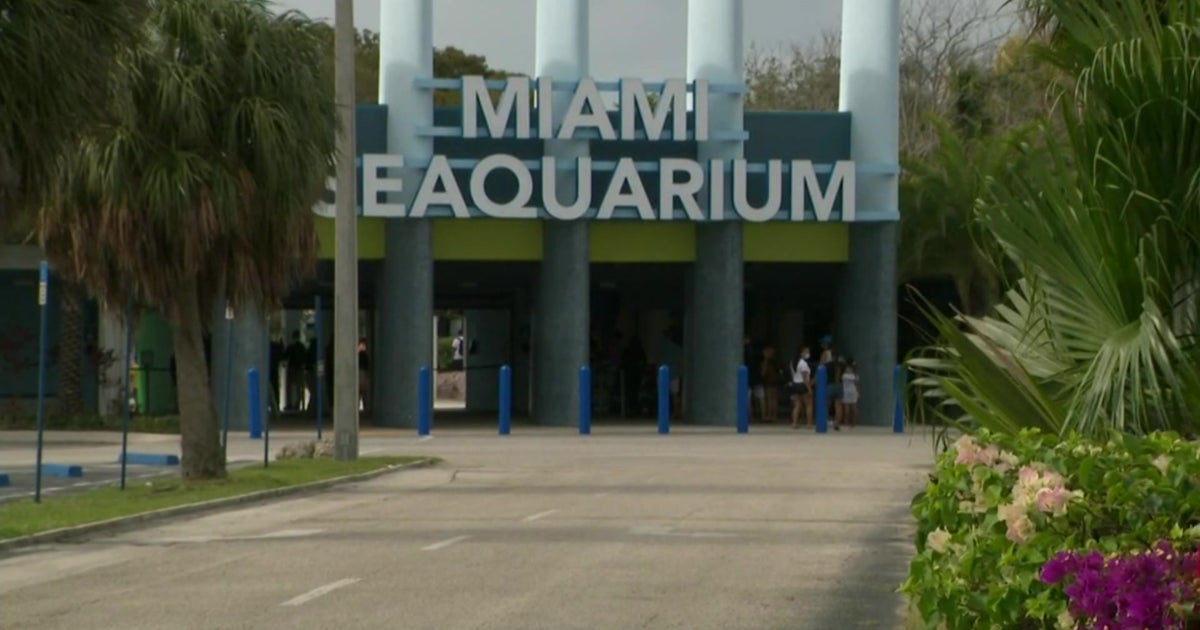Pod Of Pilot Whales Stranded Off Everglades Nat'l Park
HIGHLAND BEACH (CBSMiami) – Members of the rescue team tasked with trying to herd a pod of pilot whales away from the beach where they've stranded themselves worry some of the animals won't survive the night.
The crew of 25 volunteers spent all day Wednesday trying to usher the whales to safety.
The pod of what's believed to be short-finned pilot whales is swimming in shallow water about three-quarters of a mile off the shoreline of Highland Beach in Monroe County, about 1 and a half to two hour ride from the nearest boat ramp.
NOAA reported that there are a total of 51 whales in the pod stranded in the area. According to Blair Mase, Southeast Marine Mammal Stranding Coordinator from NOAA fisheries, a typical pod size is anywhere from 25 to 50 whales.
A group of fishermen spotted the whales Tuesday afternoon near Highland Beach, an area on the Gulf Coast of Monroe County.
According to Mase, they received the call Tuesday around 4 pm. Because it was later in the day and the sun would soon go down, attempts at rescuing did not begin until early Wednesday morning.
NOAA, Florida Fish and Wildlife Conservation Commission, the Marine Animal Rescue Society out of Miami, and Marine Mammal Conservancy, along with the aid of the National Park Service, are all assisting in the attempt to save the stranded whales.
When the crew arrived, six of the whales were dead on scene and 45 were swimming in the shallow waters, according to Mase.
A team of vets evaluated the free-swimming whales and four were determined to be in extremely poor health. Vets euthanized the four, according to Mase.
As of Wednesday afternoon, out of the 51 in the pod, Mase said that 41 remain free-swimming in the area.
While experts continue their efforts to save the whales, Mase said that considering the conditions, her expectations are low that the whales will be able to make a successful return to their normal deep-water habitat.
"I try to be realistic from the first minute that I saw what was happening," marine biologist Liz Stratton said. "Herding or leading pilots whales out of a shallow water situation is very difficult."
The deeper water where the short-finned pilot whales usually swim, according to Mase, is about 20- miles away from their current location. The challenge for the whales, and the experts attempting to herd the animals, would be navigating through the various sandbars and sand flats in the area.
Stratton, the Assistant Stranding Coordinator for NOAA Fisheries, said it pains her to see the animals in distress.
It's not clear why the whales beached themselves. Stratton said it's possible they became disoriented due to some sort of physical ailment.
Experts say pilot whales are social creatures, and if one member of the pod is sick or hurt, the rest of the group won't want to leave it behind, even if it puts their lives in danger.
Mase said the situation is not totally uncommon in Florida; in May 2011, 23 whales were stranded in Cudjoe Key and in 2012, 22 were stranded in Ft. Pierce.
The rescue is a multi-day effort and Mase believes it may continue until at least Friday.
Earlier Wednesday, Linda Friar with Everglades National Park said that rangers received a phone call Tuesday about four whales that had beached themselves. Rangers went out to investigate and found 9 whales onshore. With the help of volunteers, she said 5 were pushed back into the water but 4 were dead.
GALLERY: Pilot Whales Stranded In Everglades National Park
Short-finned pilot whales are a deep water animal commonly found in the Gulf of Mexico.
Friar explained that this type of whale is known to re-beach itself and has been seen in Everglades National Park before.
Researchers believe necropsies on the whale carcasses could shed some light on what caused the animals to end up in 3 feet of water, almost 20 miles from the depths they are usually found in.



